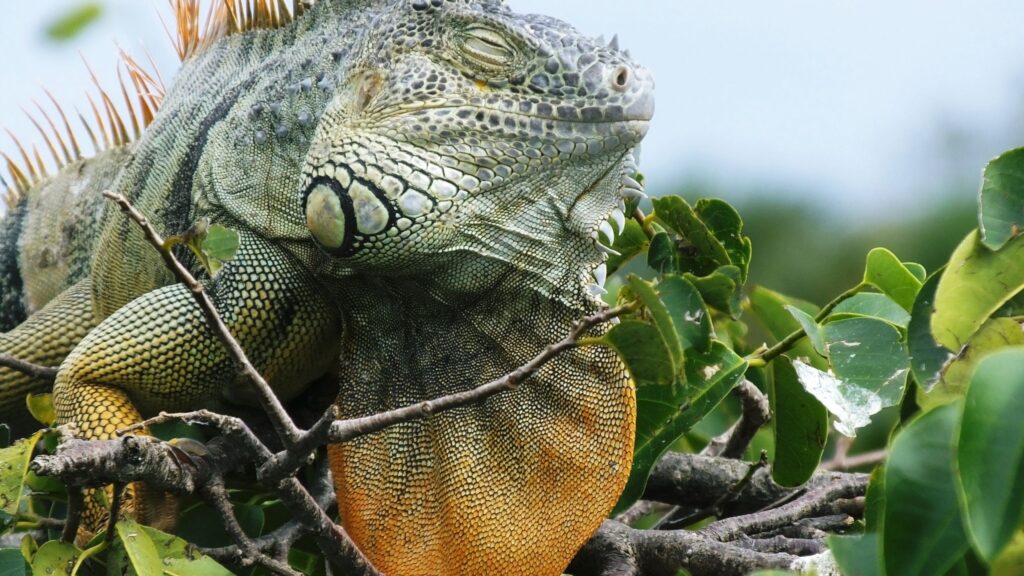Introduction
Iguanas are a common sight in Florida, known for their striking appearance and sometimes disruptive behavior. One question that often arises is, where do iguanas sleep? Understanding their sleeping habits and preferred locations can help manage their presence and minimize their impact on local environments. We hope to provide insight on the sleeping habits of iguanas, their preferred sleeping spots in Florida, and how to manage their presence effectively.
Iguana Sleeping Habits
Iguanas have specific sleeping habits that are influenced by their environment and biological needs.
1. Diurnal Reptiles
Unlike some reptiles, iguanas are diurnal, meaning they are active during the day and sleep at night.
- Activity Cycle: Iguanas spend their days foraging, basking in the sun, and exploring their territory. As the sun sets, they seek out safe places to sleep.
- Nocturnal Behavior: While they are not nocturnal, understanding their daytime activity can help predict their sleeping patterns.
2. Sleeping Locations
Iguanas prefer sleeping in locations that offer safety from predators and environmental elements.
- Tree Canopies: In the wild, iguanas often sleep high in the tree canopies. This elevated position provides safety from ground predators and a vantage point to survey their surroundings.
- Burrows and Crevices: Iguanas may also sleep in burrows or crevices in rocks. These locations offer protection from the elements and potential predators.
Common Iguana Sleeping Spots in Florida
Iguanas in Florida, have adapted to various environments, leading to a range of sleeping spots that may differ from their natural habitats.
1. Urban Areas
Iguanas in urban areas often find creative places to sleep that provide safety and comfort.
- Roofs and Eaves: In residential areas, iguanas may sleep on roofs or in the eaves of houses. These spots are high and relatively safe from ground predators.
- Garden Trees: Iguanas in suburban areas may choose tall trees in gardens or parks for their nightly rest.
2. Natural Habitats
In more natural settings, iguanas stick to their traditional sleeping spots.
- Mangroves and Forests: In coastal areas, iguanas may sleep in mangroves or forested areas. These environments offer ample tree cover and protection.
- Rocky Outcrops: In more inland areas, iguanas may use rocky outcrops and crevices as their sleeping spots.
Impact of Iguanas on Local Environments
Understanding the question of, where do iguanas sleep is crucial for managing their impact on local environments. Their presence can lead to various challenges.
1. Vegetation Damage
Iguanas can cause significant damage to vegetation in their sleeping and foraging areas.
- Tree Damage: When iguanas sleep in trees, their weight and movements can damage branches and foliage.
- Plant Consumption: Iguanas feed on a variety of plants, which can lead to the destruction of gardens and landscaping.
2. Structural Damage
In urban areas, iguanas can cause structural damage to buildings and infrastructure.
- Roof Damage: Iguanas sleeping on roofs can dislodge tiles and create entry points for water and pests.
- Burrow Damage: Iguanas that burrow can undermine foundations and cause erosion issues.
If you are in Florida and dealing with iguana issues, contact us at Iguana Busters today for a FREE estimate.
Frequently Asked Questions
No, iguanas are not nocturnal. They are diurnal, meaning they are active during the day and sleep at night.
In urban areas, iguanas may sleep on roofs, in eaves, or in tall garden trees. These locations provide safety and comfort.
To deter iguanas, remove food sources, trim tree branches near your home, and use deterrents like fencing or netting around your property.
Conclusion
Understanding the answer to the question, where do iguanas sleep is essential for managing their presence and minimizing their impact on local environments. In Florida, iguanas have adapted to various habitats, finding safe sleeping spots in both urban and natural settings. By knowing their sleeping habits and preferred locations, you can take steps to deter them from your property and protect your environment. For expert iguana control services and advice, contact Iguana Busters. Our team is dedicated to providing effective, humane, and affordable solutions to keep your property iguana-free.


